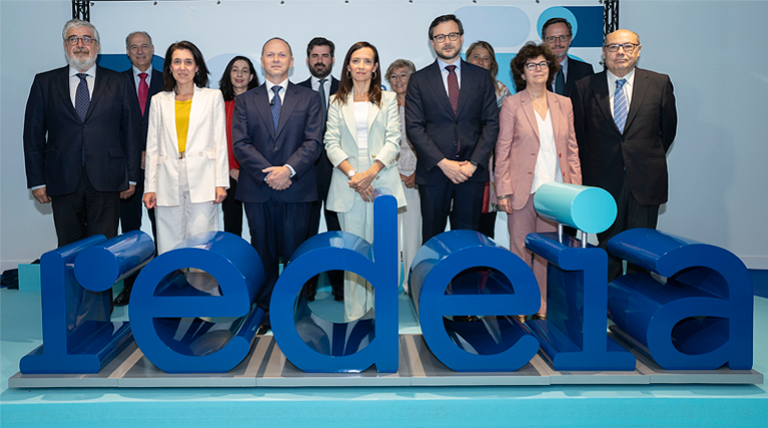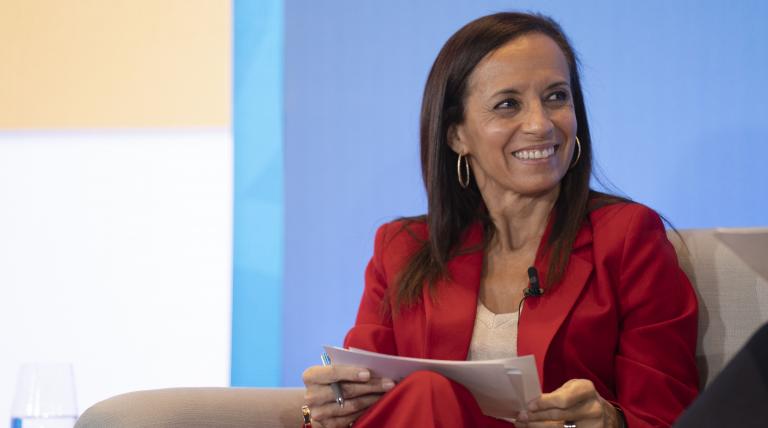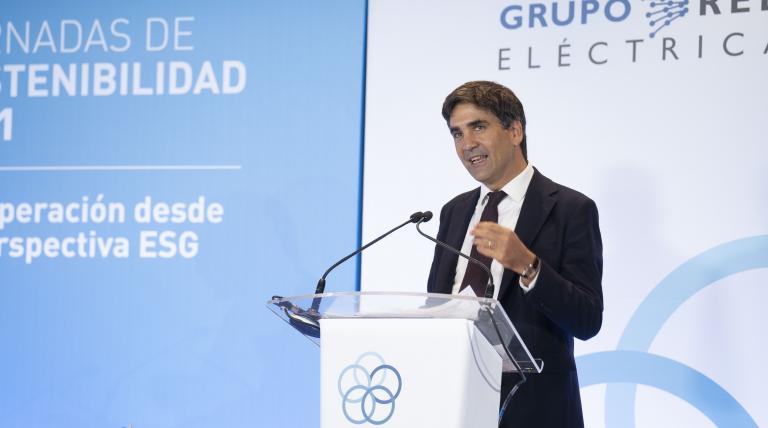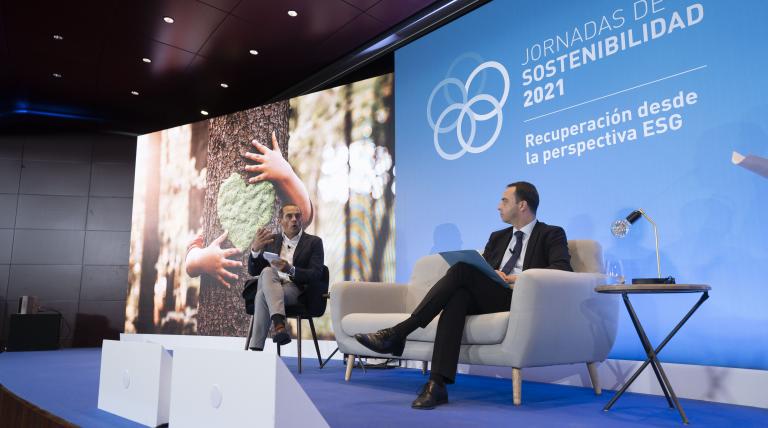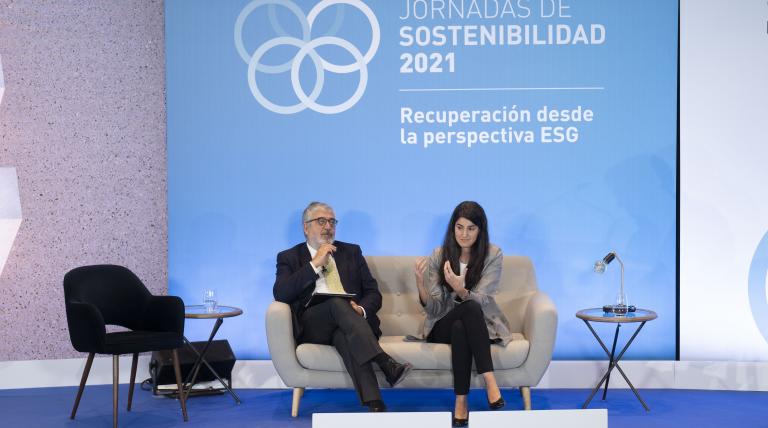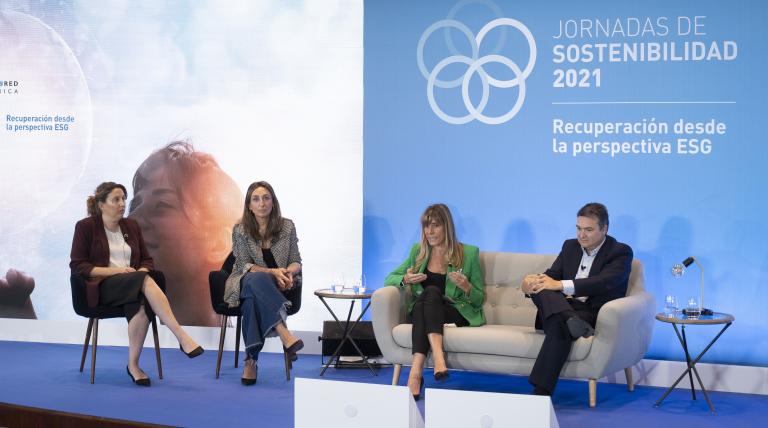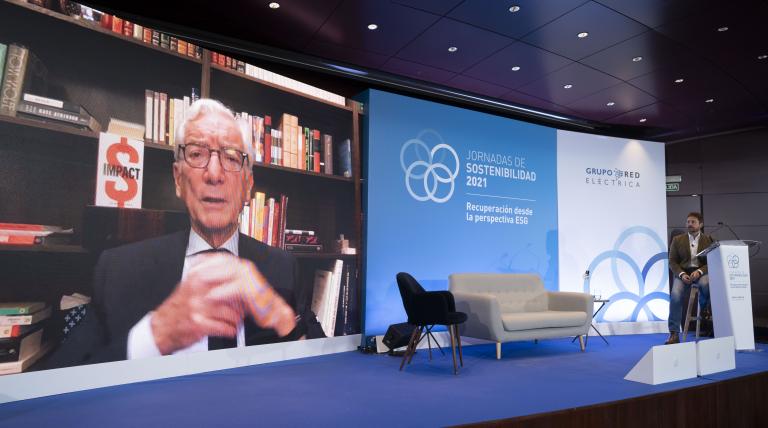We are a global operator of essential infrastructure
- Red Eléctrica Group’s chairwoman announced the new focus on social actions to combat gender, digital, territorial and intergenerational inequality in rural areas
- The Secretary of State for the Economy said “the National Plan for Recovery, Transformation and Resilience is an unprecedented instrument to achieve the leap in sustainability that we want and need following the pandemic”
{"preview_thumbnail":"/sites/default/files/styles/video_embed_wysiwyg_preview/public/video_thumbnails/jv5Ybx7raRA.jpg?itok=mndR9nVm","video_url":"https://www.youtube.com/watch?v=jv5Ybx7raRA&t=600s","settings":{"responsive":1,"width":"854","height":"480","autoplay":1},"settings_summary":["Embedded Video (Responsive, autoplaying)."]}
The Red Eléctrica Group today presented its new direction in social action through innovative projects and the support of the third sector, local agents and other companies, to reduce the digital, gender, territorial and generational inequalities that exist in rural areas. This was announced by its chairwoman, Beatriz Corredor in the final session of the 2021 Sustainability Conference, which the group has been holding in Madrid.
“Our grids cover land outside cities and this makes it our primary responsibility to fight against the inequality suffered in rural areas. We want to take the infrastructure for essential services to the countryside to ensure fair access to opportunities, creating a life network with a perspective based on defence of the environment and biodiversity, with a focus on social welfare”, she said, and added: “We don’t want communities to think we just appear, set up our infrastructures and leave, but that we are staying there so that we can improve their lives”.
In a session that centred on the ‘S’ of the ESG factors (Environmental Social and Governance aspects of management), Corredor pointed out that Red Eléctrica has been committed to environmental sustainability and governance for some time now. “This new focus on social innovation means that we want to take a leap forward to make the ‘S’ a real pivot for transformation, increasing the capacity for our social action to have an impact and be scalable”, she explained.
The Secretary of State for the Economy and Business Support, Gonzalo García, closed the sessions reminding us that “the National Plan for Recovery, Transformation and Resilience is an unprecedented instrument to achieve the leap in sustainability that we want and need following the pandemic”. Alfredo González, Secretary of State for Territorial Policy, also took part and he emphasised the importance of balanced territorial development, because, as he believes, “caring for the territory also means looking after the people who live there to ensure social cohesion and opportunities for all”.
Projects to tackle the digital gap, lack of school qualifications, unemployment and population loss
The Red Eléctrica Group is embarking on a new activity in four main critical areas. The first of these is the land covered by its grids, mainly in rural areas. To eliminate these imbalances, the Group will enable energy transition and encourage local entrepreneurship and innovation.
In this regard, the second area of action is the gap in access to the digital society, encouraging universal connectivity in areas where it works and the digital competence of the whole population. To achieve this, it has announced a project with the NGO Action against Hunger to enable the inclusion of vulnerable groups in society and employment through training in digital skills and knowledge.
The third area is gender inequality. As an exemplary company in terms of female leadership and the promotion of female talent, the Group is going to extend this commitment to gender equality through support for rural women, with projects such as the setting up of an e-commerce platform for the sale of products from small-scale agricultural companies run by women, through Fademur.
Finally, the Group is going to work in the areas of childhood and youth, seeking to reduce premature school leaving and educational failure among students in rural areas, helping them to get training and access to the job market in professions linked to the energy transition. For this objective the company will expand its collaboration the High Commissioner for Child Poverty and with training organisations.
Investment with social impact and a new business model
Investment with social impact, the role of citizens in the climate emergency or companies’ contribution to a sustainable future, are other issues that were raised in this final session of the conferences.
Sir Ronald Cohen, president of the Global Steering Group for Impact Investment, stated: “companies have a commitment to create value for our stakeholders, the future of our companies, our communities and our countries. To the extent that impact investment offers a desirable combination of financial performance and impact, it is rather more than a moral choice: it is a smart business decision and the investors will see that we can increase our returns, not despite the impact, but because of it.
For her part, Begoña Gómez, director of the Group for Competitive Social Transformation at the Universidad Complutense de Madrid, affirmed that “the new economy requires another kind of company, one that looks beyond its business and includes social and ecological variable that have a positive impact on its environment”.
Juan Verde, president of Advanced Leadership Foundation, added that “we have to expand our vision of sustainability beyond the issue of the environment. Being sustainable means working for everyone’s long-term benefit. The pandemic has given us the opportunity to reset and to do things better. In the words of the President of the United States, Joe Biden, it is about ‘building back better’. This is the opportunity”.
Today’s session also saw contributions from José Juan Ruiz, president of the Sustainability Committee of the Red Eléctrica Group; Clara Martinez-Toledano, from Imperial College London; Mónica Chao, director of Sustainability at IKEA and president of WAS; Cristina Sánchez, executive director of the Global Pact of the United Nations in Spain; Germán Granda, director general of Forética; and Alberto Barreiro, of Transformational Studio.
The 2021 Sustainability Conference is supported by the Global Pact of the United Nations Spain, Forética and Women Action Sustainability.













